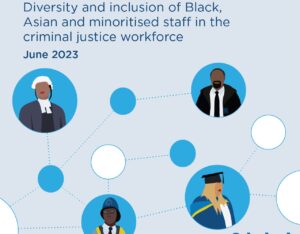Pre-Application Judicial Education
Yesterday (25 April 2018), the Lord Chancellor (and Justice Secretary) David Gauke announced a new initiative to try to increase the diversity of our judges with four main components:
- government funding for a new judicial education programme
- support from Judiciary, Judicial College and legal professional bodies
- online education platform for potential candidates
- targeted support for underrepresented groups
A new online learning platform will enable candidates from all legal backgrounds to develop their understanding of the role and skills required of a judge, and how their legal experience has prepared them for judicial office, prior to making an application.
The Pre-Application Judicial Education (PAJE) programme is a joint initiative from the Judicial Diversity Forum, which is made up of MOJ, Judiciary, Judicial Appointments Commission, Bar Council, Law Society and Chartered Institute of Legal Executives and coordinates action to remove barriers to candidates from underrepresented groups applying to be judges.
Additional, targeted support will be available to those applicants from groups that are underrepresented in the judiciary via discussion sessions led by judges. This will give potential candidates insight into the realities of the role and offer an opportunity to address any perceptions they may have on barriers to judicial office.
Development of the programme will be funded by the MOJ, with Forum partners contributing to further running costs.
PAJE is the first initiative delivered jointly by all members of the Judicial Diversity Forum and partners will continue to work together on actions to drive diversity.
A new online learning platform will enable candidates from all legal backgrounds to develop their understanding of the role and skills required of a judge, and how their legal experience has prepared them for judicial office, prior to making an application.
The Pre-Application Judicial Education (PAJE) programme is a joint initiative from the Judicial Diversity Forum, which is made up of MOJ, Judiciary, Judicial Appointments Commission, Bar Council, Law Society and Chartered Institute of Legal Executives and coordinates action to remove barriers to candidates from underrepresented groups applying to be judges.
Additional, targeted support will be available to those applicants from groups that are underrepresented in the judiciary via discussion sessions led by judges. This will give potential candidates insight into the realities of the role and offer an opportunity to address any perceptions they may have on barriers to judicial office.
Development of the programme will be funded by the MOJ, with Forum partners contributing to further running costs.
PAJE is the first initiative delivered jointly by all members of the Judicial Diversity Forum and partners will continue to work together on actions to drive diversity.

Conclusion
This is a fairly modest initiative – MoJ funding is just £152,000 over three years with similar funding from its partners.
Nonetheless, it is good to see the MoJ taking the recommendations of the Lammy review seriously. Lammy found that just 7% of 3,000 judges were from a BAME background.







